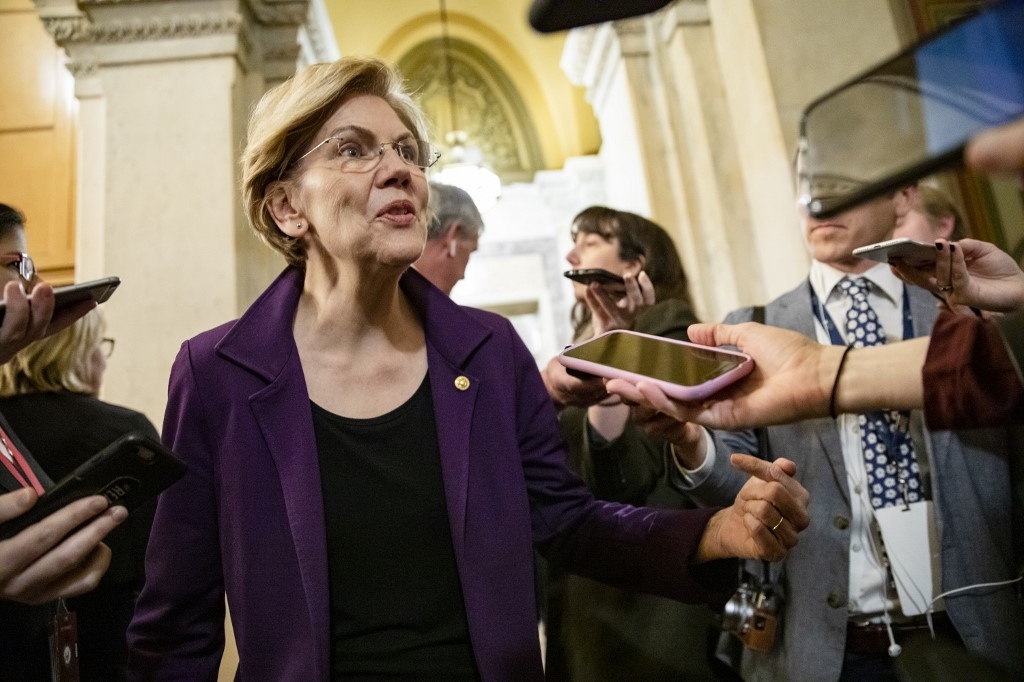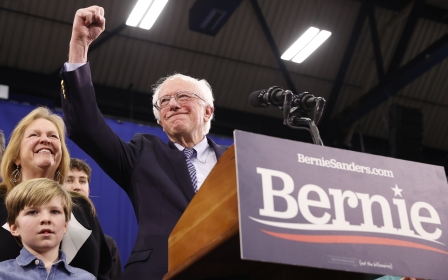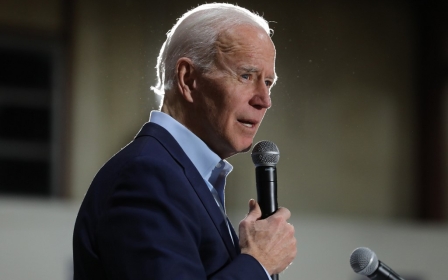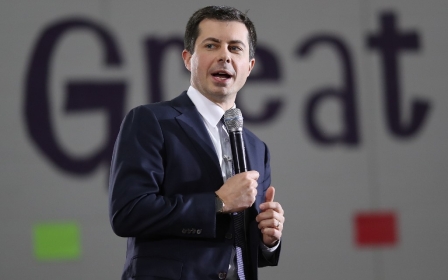US election 2020: Where does Elizabeth Warren stand on Middle East issues?

Massachusetts Senator Elizabeth Warren, a front-runner in the Democratic primaries, has been a strong voice for progressive politics on domestic issues.
But critics say foreign policy is not her strongest suit.
Warren has had a career championing progressive domestic policy and fighting for economic equality, healthcare, and education reform.
After graduating from Rutgers Law School in 1976, she set herself on a path to Harvard, becoming a professor of bankruptcy law.
She was appointed to numerous advisory roles in the US government, advocating for consumer protections against mortgages and credit cards.
New MEE newsletter: Jerusalem Dispatch
Sign up to get the latest insights and analysis on Israel-Palestine, alongside Turkey Unpacked and other MEE newsletters
Eventually, Warren caught the eye of then-President Barack Obama, who tasked her with helping launch the new Consumer Financial Protection Bureau. She had outlined the idea of such an agency years prior.
In 2012, Warren was elected to the US Senate in Massachusetts, succeeding Republican Scott Brown, who had won the seat in the liberal state after an upset victory in a special election following the death of Senator Ted Kennedy.
Warren has a proven track record of progressive domestic policies, but where does she stand on issues related to the Middle East?
On Saudi Arabia: 'Time to reorient' away
Similar to other top Democrats during the Trump presidency, Warren has been critical of the United States' relationship with Saudi Arabia.
In 2017, the senator voted to block a $510m sale of precision-guided munitions to Riyadh.
In March 2018, she and eight other Senate Democrats sent a letter to King Salman urging him to release multiple Saudi activists, including women's rights activist Loujain al-Hathloul and writer Raif Badawi.
The Massachusetts senator also co-sponsored a bill in 2019 to end US support for the Saudi-led coalition's war in Yemen.
"It is time to reorient our policy in the region away from a reflexive embrace of the Saudi regime and toward one that focuses on US interests," Warren told the Council on Foreign Relations in September.
On Iran: Supported nuclear deal but backed sanctions
Warren has remained largely in line with the mainstream Democratic Party's views towards Iran.
She supported the Iran nuclear deal, when it was first announced by Obama, but also said at the time she does "not trust the Iranian regime".
In July 2017, she voted for a bill grouping together sanctions against Russia, Iran, and North Korea, despite a warning from Obama's secretary of state, John Kerry, who said the legislation would undermine the nuclear deal.
The multilateral Iran pact, known as the JCPOA, saw Tehran scale back its nuclear programme in exchange for lifting sanctions against its economy.
After Trump walked away from the deal, Warren said she supported reinstating it.
"The nuclear deal is still working, so I think enforcing the current deal to prevent Iran from getting a nuclear weapon is a whole lot better than no deal at all," Warren said in a hearing for the Senate Armed Services Committee in 2018.
She co-sponsored a bill in May 2019 that would stop any US funds from being used for military action against Iran without congressional authorisation.
"The JCPOA is only the beginning," she told CFR. "We will need to negotiate a follow-on to the agreement that continues to constrain Iran's nuclear program past the 'sunset' of some of its original terms."
In the aftermath of the assassination of Iran's top general Qassem Soleimani, Warren rebuked Trump for increasing tensions with Iran and stoking the possibility of war.
However, her initial response of labelling Soleimani as a "murderer" changed a day later when she described the general only as a "government official, a high-ranking military official".
"Donald Trump ripped up an Iran nuclear deal that was working. He’s repeatedly escalated tensions," she said in a tweet at the time.
"Now he's assassinated a senior foreign military official. He’s been marching toward war with Iran since his first days in office—but the American people won’t stand for it."
On Israel: A 'strong ally'
Regarding Israel and Palestine, the senator has somewhat shifted her stance in recent years.
In 2014, during Israel's war on the Gaza Strip which left more than 2,200 Palestinians dead, Warren voted to send $225m in additional military funding for Israel.
"When Hamas puts its rocket launchers next to hospitals, next to schools, they're using their civilian population to protect their military assets," she said at a town hall meeting in 2014.
"And I believe Israel has a right, at that point, to defend itself."
She also co-sponsored the US-Israel Strategic Partnership Act of 2014, which solidified Washington's aid and security commitment to Israel.
But mirroring a wider shift within the progressive wing of the Democratic Party, Warren has recently become more critical of Israel.
Along with other prominent Democrats, she has criticised Trump's decision to move the US embassy in Israel from Tel Aviv to Jerusalem.
"Diplomacy between Israelis and Palestinians should determine the status of Jerusalem for all parties," she said at a Union for Reform Judaism conference in late 2017.
In the same year, Warren signed a letter warning Israeli Prime Minister Benjamin Netanyahu against demolishing the West Bank Palestinian villages of Khan al-Ahmar and Susiya.
At the annual J Street conference in October 2019, the senator said US aid to Israel should not be used on settlements, a clear shift in her previously hawkish pro-Israel stance.
However, she still maintained her support for Israel's national security.
"I believe that Israel is a strong and important ally," she said. "I am committed to Israel's security and safety and cooperating closely on the threats the Israelis face from Hamas, Hezbollah and Iran."
Other notable views
Warren, who has three brothers who served in the US military, said multiple times that she supports withdrawing troops from Syria.
When Trump made the snap announcement in December 2018 to pull troops from the country, the candidate supported the move.
However, when Trump announced in October that he was pulling troops from northeastern Syria to pave way for a Turkish incursion, Warren criticised the decision.
"I support bringing our troops home from Syria," Warren tweeted. "But President Trump's reckless and unplanned withdrawal undermines both our partners and our security."
In September, after thousands of Egyptians took to the streets to protest against President Abdel Fatteh el-Sisi, Warren came out in support of the demonstrators.
"We should stand with the protesters in Egypt fighting for a better future—and we must be clear that violence and repression are unacceptable responses to those who seek to express their opinion or affect political change."
An interesting fact
Elizabeth Warren's first foreign visit as a US senator was to Israel.
The trip was made in November 2014, a few months after the war in Gaza that killed nearly 2,200 Palestinians and 73 Israelis.
A memorable quote
"America has a very special relationship with Israel. Israel lives in a very dangerous part of the world, and a part of the world where there aren't many liberal democracies and democracies that are controlled by the rule of law. And we very much need an ally in that part of the world."
- At town hall in Hyannis, Massachusetts in August 2014.
Middle East Eye delivers independent and unrivalled coverage and analysis of the Middle East, North Africa and beyond. To learn more about republishing this content and the associated fees, please fill out this form. More about MEE can be found here.




